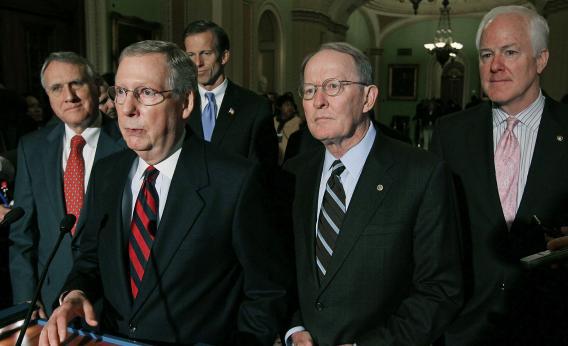National Review’s Robert Costa has a fresh Mitch McConnell profile out that involves some interesting episodes where Costa just uncritically reprints McConnell saying bizarre things. Here he is on immigration, for example:
“The Democrats’ insistence on having it be comprehensive is what makes this hard to pass,” he says. “Their goal is clear: to make the folks here legal voters as rapidly as possible. Ideally, what you would do is what the House is trying to do: break it up into pieces and let each piece stand on its own. The reason I’m not optimistic about an acceptable outcome is that I can’t imagine the Senate passing pieces that improve legal immigration, and I can’t envision the House doing comprehensive.”
“I’d prefer a Stephen Douglas approach,” McConnell says, referring to the late Democratic senator’s approach to the Compromise of 1850, in which Douglas ushered a package of separate bills through Congress in order to keep the peace between slave states and free states. He says Douglas’s genius was recognizing that one large, controversial bill can easily sink, but lawmakers can deftly arrange single-issue bills to achieve a similar end.
Remember the Compromise of 1850? In case you don’t, the key provisions were that the north got California admitted as a free state, slave-owning Texas got a massive financial bailout, slave auctions were banned in the District of Columbia, and a much more severe Fugitive Slave Act was put into place. Under the terms of the Act, any law enforcement official anywhere in the United States was obligated to arrest any black person who some white southerner was willing to swear was his property.
Not a great all-around moment for the United States Congress in my opinion. But also not even remotely applicable to the immigration situation. Recall that the state of play on immigration is this. The Gang of 8 drafted a comprehensive immigration reform bill that obtained 68 votes in the United States Senate. It appears likely that a very similar bill could obtain majority support in the United States House of Representatives. The problem is that the Speaker of the United States House of Representatives won’t bring the bill to the floor for a vote. This is absolutely his right as a party leader, but the GOP could also waive that right if they wanted to. Their unwillingness to do so is what’s preventing a bipartisan bill from being enacted. Breaking the bill down into separate elements each of which would be separately subject to the Hastert Rule wouldn’t change anything. The issue here isn’t that a comprehensive bill can’t get majority support, it’s that a comprehensive bill can’t get a floor vote. The 1850 equivalent would be if Southern Democrats used the fact that they were a majority of the Democratic caucus to prevent California statehood from getting a vote, even though the combined weight of Northern Democrats and Whigs was enough to give it majority support.
The bottom line here is that if immigration reform doesn’t pass, it’ll be because Republican leaders didn’t want it to pass and Republican House members who say they do want an immigration bill to pass weren’t willing to challenge their leadership with a discharge petition. But Republicans somehow want immigration reform to die an immaculate death in which nobody in particular killed it. Hence McConnell reaching for a weird historical analogy he can use to muddy the waters.
